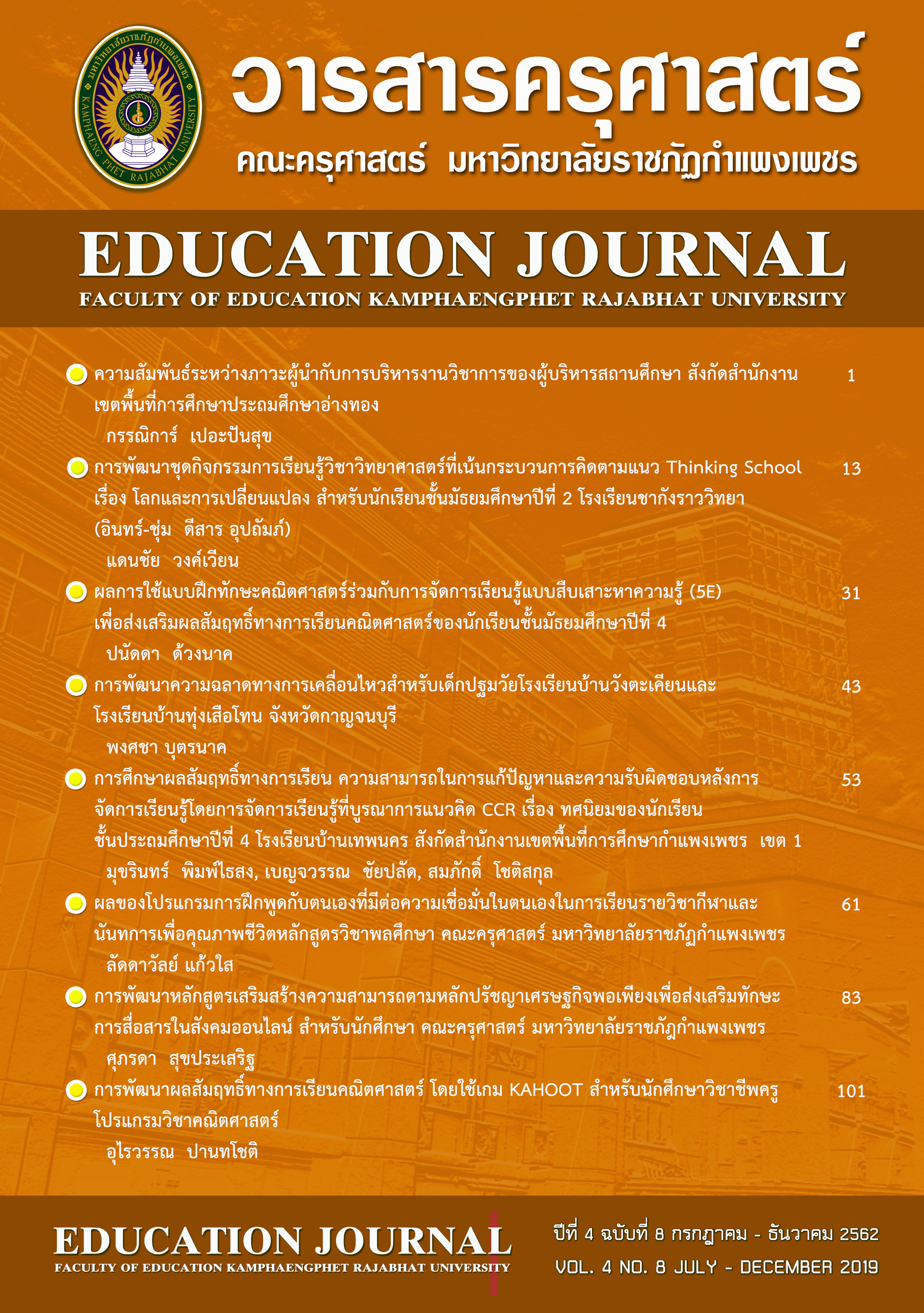A DEVELOPMENT OF A TRAINING COURSE CURRICULUM BASED ON THE PHILOSOPHY OF SUFFICIENCY ECONOMY TO ENHANCE SOCIAL MEDIA COMMUNICATION SKILLS FOR STUDENTS, FACULTY OF EDUCATION, KAMPHAENGPHET RAJABHAT UNIVERSITY
Main Article Content
Abstract
This research has as objective to develop a training course curriculum based on the philosophy of sufficiency economy to enhance social media communication skills for second year Thai language students, Faculty of education, kamphaengphet Rajabhat University. The method used in conducting this study was research and development methodology. The sample group included second year Thai language students, 2nd semester of the academic year in 2018 gotten through purposive Sampling from Faculty of education. The developed curriculum and related documents formed the research instruments. The instruments used for data collection included pre-test and post-test for knowledge assessment, skill assessment form and attitude assessment form.
The results revealed that 1) Results from the pilot study revealed that the developed course training curriculum with 8 components is appropriate, consistent and suitable at the highest level. 2) After the implementation of the curriculum 2.1) Students' knowledge on social media communication was higher than before at a significant level of .05. 2.2) Students’ social communication skills after the implementation of the curriculum was higher than the gain 70% 2.3) Students had a positive attitude towards the developed training course curriculum based on the philosophy of sufficiency economy. 3.) The results of an evaluation of students’ opinions toward a training course curriculum based on the philosophy of sufficiency economy to enhance students’ social media communication skills in the faculty of Education, kamphaengphet Rajabhat University was the highest level
Article Details

This work is licensed under a Creative Commons Attribution-NonCommercial 4.0 International License.
CC Attribution-NonCommercial-NoDerivatives 4.0
References
กนกอร ปราชญ์นคร. (2550). การพัฒนาหลักสูตรอบรมเสริมสร้างสมรรถนะข้าราชการประจำศูนย์. ปฏิบัติการต่อสู้เอาชนะยาเสพติดจังหวัด. ปริญญานิพนธ์การศึกษาดุษฎีบัณฑิต.
เกรียงศักดิ์ เจริญวงศ์ศักดิ์. 2546. การคิดเชิงบูรณาการ. กรุงเทพฯ : บริษัทซัคเซส มีเดีย.
เขมณัฏฐ์ มิ่งศิริธรรม. (2557). Social media สื่อสร้างสรรค์เพื่อการศึกษา. สืบค้นเมื่อ 12 มกราคม2559, จากhttp://www.ejournal.su.ac.th/upload/556.pdf.
คันศร คงยืน. (2552). การพัฒนาหลักสูตรฝึกอบรมเพื่อเสริมสรรถนะหัวหน้าศูนย์บ่มเพาะอาชีวศึกษาในวิทยาลัย สังกัดสำนักงานคณะกรรมการการอาชีวศึกษา.วิทยานิพนธ์ ศษ.ด., มหาวิทยาลัยวงษ์เชาวลิตกุล, นครราชสีมา.
ณัฐพล บัวอุไร. (2555). ผลการจัดการเรียนการสอนโดยใช้สื่อสังคมออนไลน์ตามทฤษฎีการสร้างองค์ความรู้ด้วยตนเอง วิชาการสร้างงานสื่อผสม เรื่องคอมพิวเตอร์และอินเทอร์เน็ตระดับชั้นมัธยมศึกษาปีที่ 4 โรงเรียนเตรียมอุดมศึกษาพัฒนาการลำลูกกา. วิทยานิพนธ์ศึกษาศาสตรมหาบัณฑิต, สาขาวิชาการวิจัยและประเมินทางการศึกษา, บัณฑิตวิทยาลัย, มหาวิทยาลัยเกษตรศาสตร์.
ธนะวัฒน์ วรรณประภา. (2560) .สื่อสังคมออนไลน์กับการศึกษา.นวัตกรรมและเทคโนโลยีการศึกษา คณะศึกษาศาสตร์ มหาวิทยาลัยบูรพา.
มนต์นัทธ์ เลิศเกียรติดารงค์. (2553). การวิเคราะห์และการพัฒนาการออกแบบแผ่นป้ายโฆษณาบนอินเทอร์เน็ต (การค้นคว้าอิสระศิลปศาสตรมหาบัณฑิต). มหาวิทยาลัยเชียงใหม่, เชียงใหม่.
วารีรัตน์ แก้วอุไร และคณะ. (2554). รายงานการวิจัยการพัฒนารูปแบบการจัดการเรียนรู้ตามหลักปรัชญาของเศรษฐกิจพอเพียง ในรายวิชาชีพครู กลุ่มมหาวิทยาลัยภาคเหนือ. พิษณุโลก: คณะศึกษาศาสตร์ มหาวิทยาลัยนเรศวร.
วิจิตร อาวะกุล. (2540). การฝึกอบรม. กรุงเทพฯ: ศูนย์หนังสือจุฬาลงกรณ์มหาวิทยาลัย.
สงัด อุทรานันท์. (2532). พื้นฐานและหลักการพัฒนาหลักสูตร (พิมพ์ครั้งที่3). กรุงเทพฯ: มิตรสยาม.
สุวัฒน์ วิวัฒนานนท์ . (2560). การพัฒนาทักษะการอ่าน คิดวิเคราะห์ และเขียนสื่อความโดยใช้รูปแบบพหุระดับ ระดับโรงเรียน ห้องเรียน และนักเรียน . วารสารวิชาการมหาวิทยาลัยบูรพา ปีที่ 17 ฉบับที่ 3 (ก.ค.-ก.ย. 2557) หน้า 46-61.
แสงเดือน ผ่องพุฒ. (2556). สื่อสังคมออนไลน์: แนวทางการนำมาประยุกต์ใช้. สืบค้นเมื่อ 12 มกราคม2559, จาก http://library.senate.go.th/document/Ext6685/668599.pdf.
อุทุมพร หล่อสมฤดี. (2545). รูปแบบการพัฒนาหลักสูตรโรงเรียน. ปริญญานิพนธ์การศึกษาดุษฎีบัณฑิต, มหาวิทยาลัยศรีนครินทรวิโรฒ.
Lionberger, H. F. (1960). Adoption ofNew Ideas and Practices. Ames, IA: Iowa State University.
Solis, B. (2016). The conversation prism. สืบค้นเมื่อ 12 มกราคม 2559, จาก https://conversationprism.com/.
Taba, Hilda. (1962). Curriculum development : theory and practice. New York: Harcout Brace and world.


